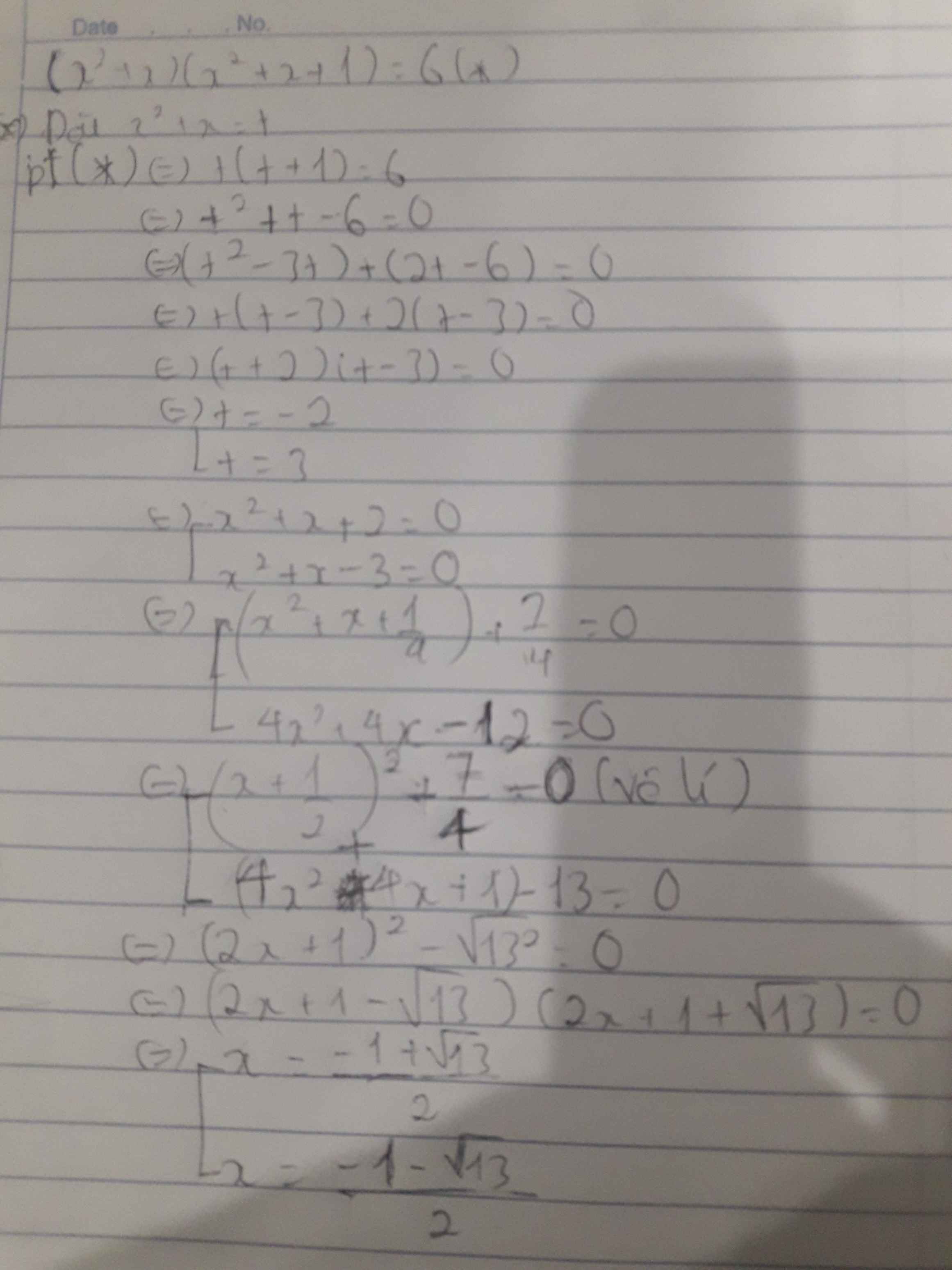tìm x biết (x-1)^x+2 = (x-1)^x+6

Những câu hỏi liên quan
1, Tìm x, biết \(x^2\) – 36 = 0
A. x = 6. B. x = -6.
C. x = 6; x = -6. D. x = 36 hoặc x = - 36.
2, Tìm x, biết \(x^3\) – 3\(x^2\) + 3x - 1 = 0
A. x = 1. B. x = -1. C. x = 0. D. x = 2.
Bài 1 : Tìm x ,y,z biết:
a, 3/x-1 = 4/y-2 = 5/z-3 và x+y+z = 18
b, 3/x-1 = 4/y-2 = 5/z-3 và x.y.z = 192
Bài 2 : Tìm x,y,z biết : x^3+y^3/6 = x^3-2y^3/4 và x^6.y^6 = 64
Bài 3 : Tìm x,y,z biết :x+4/6 = 3y-1/8 = 3y-x-5/x
Bài 4 :Tìm x,y,z biết : x+y+2005/z = y+z-2006 = z+x+1/y = 2/x+y+z
bài 1 : a,ta có 3/x-1 =4/y-2=5/z-3 => x-1/3=y-2/4=z-3/5
áp dụng .... => x-1+y-2+z-3 / 3+4+5 = x+y+z-1-2-3/3+4+5 = 12/12=1
do x-1/3 = 1 => x-1 = 3 => x= 4 ( tìm y,z tương tự
Đúng 2
Bình luận (0)
Bài 1:
a) Ta có: 3/x - 1 = 4/y - 2 = 5/z - 3 => x - 1/3 = y - 2/4 = z - 3/5 áp dụng ... =>x - 1 + y - 2 + z - 3/3 + 4 + 5 = x + y + z - 1 - 2 - 3/3 + 4 + 5 = 12/12 = 1 do x - 1/3 = 1 => x - 1 = 3 => x = 4 ( tìm y, z tương tự )
Xem thêm câu trả lời
Cho biểu thức B =(\(\dfrac{x^3}{x^3-4x}+\dfrac{6}{^{6-3x}}+\dfrac{1}{2+x}\)): (x+2+\(\dfrac{10-x^2}{x-2}\))
a) Rút gọn B
b) Tìm B biết x2-5x+6=0
c) Tìm x ∈ Z để B ∈ Z
d) Tìm x biết |B|>1
bài 1 : tìm x biết a, ( x - 2 ) : 2 x 3 6b, X : ( hỗn số 3 1/2 x hỗn số 2 2/3 ) 9/56c, 1 + 3 + 5 + .....+ ( 2 x X + 1 ) 625bài 2 : tìm x biếta, ( x - 1/2 ) x 5/3 7/4 - 1/2b, 5 x X + X 42c, ( x+1 ) + ( x+ 3 ) + ( x + 5 ) + ....+ ( x + 11 ) 58bài 3 tìm x biếta, X - 1,25 x 4 7,5b, X ( hỗn số 6 3/5 : 6 - 0 , 125 x 8 + hỗn số 2 2/15 x 0,03 ) x 2/11c, ( X + 1 ) +(X + 2 ) + ( X + 3 ) + ....+(X + 20 ) 750
Đọc tiếp
bài 1 : tìm x biết
a, ( x - 2 ) : 2 x 3 = 6
b, X : ( hỗn số 3 1/2 x hỗn số 2 2/3 ) = 9/56
c, 1 + 3 + 5 + .....+ ( 2 x X + 1 ) = 625
bài 2 : tìm x biết
a, ( x - 1/2 ) x 5/3 = 7/4 - 1/2
b, 5 x X + X = 42
c, ( x+1 ) + ( x+ 3 ) + ( x + 5 ) + ....+ ( x + 11 ) = 58
bài 3 tìm x biết
a, X - 1,25 x 4 = 7,5
b, X = ( hỗn số 6 3/5 : 6 - 0 , 125 x 8 + hỗn số 2 2/15 x 0,03 ) x 2/11
c, ( X + 1 ) +(X + 2 ) + ( X + 3 ) + ....+(X + 20 ) = 750
1
\(\left(x-2\right):2.3=6\)
\(\Leftrightarrow\left(x-2\right):2=2\)
\(\Leftrightarrow\left(x-2\right)=4\)
\(\Leftrightarrow x=4+2=6\)
c) ta có
\(\left[\left(2x+1\right)+1\right]m:2=625\)
\(\Leftrightarrow\left[\left(2x+1\right)+1\right]\left\{\left[\left(2x+1\right)-1\right]:2+1\right\}=1250\)
\(\Leftrightarrow\left(2x+1\right)^2+1-1:2+1=1250\)
\(\Leftrightarrow\left(2x+1\right)^2+1-2+1=1250\)
\(\Leftrightarrow\left(2x+1\right)^2+1-2=1249\)
\(\Leftrightarrow\left(2x+1\right)^2+1=1251\)
\(\Leftrightarrow\left(2x+1\right)^2=1250\)
...
2
\(\left(x-\frac{1}{2}\right).\frac{5}{3}=\frac{7}{4}-\frac{1}{2}\)
\(\Leftrightarrow\left(x-\frac{1}{2}\right).\frac{5}{3}=\frac{5}{4}\)
\(\Leftrightarrow\left(x-\frac{1}{2}\right)=\frac{5}{4}:\frac{5}{3}\)
\(\Leftrightarrow\left(x-\frac{1}{2}\right)=\frac{5}{4}.\frac{3}{5}\)
\(\Leftrightarrow x-\frac{1}{2}=\frac{3}{4}\)
\(\Leftrightarrow x=\frac{3}{4}+\frac{1}{2}=\frac{5}{4}\)
Tìm x biết
(
3
x
–
1
)
2
+
2
(
x
+
3
)
2
+
11
(
1
+...
Đọc tiếp
Tìm x biết ( 3 x – 1 ) 2 + 2 ( x + 3 ) 2 + 11 ( 1 + x ) ( 1 – x ) = 6
A. x = -4
B. x = 4
C. x = -1
D. x = -2
Ta có
( 3 x – 1 ) 2 + 2 ( x + 3 ) 2 + 11 ( 1 + x ) ( 1 – x ) = 6 ⇔ ( 3 x ) 2 – 2 . 3 x . 1 + 1 2 + 2 ( x 2 + 6 x + 9 ) + 11 ( 1 – x 2 ) = 6 ⇔ 9 x 2 – 6 x + 1 + 2 x 2 + 12 x + 18 + 11 – 11 x 2 = 6 ⇔ ( 9 x 2 + 2 x 2 – 11 x 2 ) + ( - 6 x + 12 x ) = 6 – 1 – 11 – 18
ó 6x = -24 ó x = -4
Vậy x = -4
Đáp án cần chọn là: A
Đúng 0
Bình luận (0)
tìm x, biết :
d)(x - 3)(x^2 + 3x + 9) + x(x + 2)(2 - x) = 1
e) (x + 1)^3 - (x - 1)^3 - 6(x - 1)^2 = -19
d. (x - 3)(x2 + 3x + 9) + x(x + 2)(2 - x) = 1
<=> x3 - 9 + (x2 + 2x)(2 - x) = 1
<=> x3 - 9 + 2x2 - x3 + 4x - 2x2 = 1
<=> 4x = 10
<=> x = \(\dfrac{10}{4}=\dfrac{5}{2}\)
Đúng 1
Bình luận (0)
d)(x - 3)(x^2 + 3x + 9) + x(x + 2)(2 - x) = 1
\(<=> x^3-27-x(x^2-4)=1\)
\(<=> x^3-27-x^3-4x=1<=>-4x=28<=> x=-7\)
=> ptrình có tập nghiệm S={-7}
e) (x + 1)^3 - (x - 1)^3 - 6(x - 1)^2 = -19
\(<=> x^3+3x^2+3x+1-(x^3-3x^2+3x-1)-6(x^2-2x+1)+19=0\)
\(<=>x^3+3x^2+3x+1-x^3+3x^2-3x+1-6x^2+12x-6+19=0\)
\(<=>12x=15<=>x=12/15 \)
=> ptrình có tập nghiệm S={12/15}
Đúng 1
Bình luận (0)
Tìm x biết: (x^2 +x) (x^2+x+1) = 6
Tìm x, biết:
\((x^2+x) (x^2+x+1)=6\)
\(\Leftrightarrow\left(x^2+x\right)^2+\left(x^2+x\right)-6=0\)
\(\Leftrightarrow\left(x^2+x+3\right)\left(x^2+x-2\right)=0\)
=>(x+2)(x-1)=0
=>x=-2 hoặc x=1
Đúng 2
Bình luận (0)
\(\Leftrightarrow x^4+x^3+x^2+x^3+x^2+x=0\)
\(\Leftrightarrow x^4+2x^3+2x^2+x=0\)
\(\Leftrightarrow x^3\left(x+2\right)+x\left(2+x\right)=0\)
\(\Leftrightarrow\left(x+2\right)\left(x^3+x\right)=0\)
\(\Leftrightarrow x\left(x+2\right)\left(x^2+1\right)=0\)
\(\Leftrightarrow x\left(x+2\right)\left(x+1\right)\left(x+1\right)=0\)
\(\Leftrightarrow\left[{}\begin{matrix}x=0\\x=-2\\x=-1\end{matrix}\right.\)
Đúng 2
Bình luận (0)
\(\left(x^2+x\right)\left(x^2+x+1\right)=0\)
\(x\left(x+1\right)\left(x^2+x+1\right)=0\)
=> x=0 hoặc x+1=0 (do \(x^2+x+1\ne0\))
x=-1
Vậy...
Đúng 1
Bình luận (0)
TÌM X BIẾT: 6(x+1)^2-2(x+1)^3+2(x-1)(x^2+x+1) = 0


































